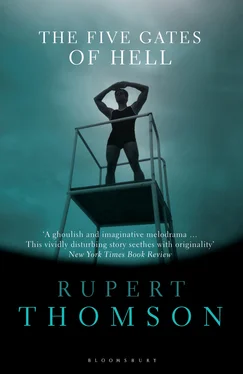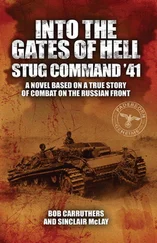Rupert Thomson - The Five Gates of Hell
Здесь есть возможность читать онлайн «Rupert Thomson - The Five Gates of Hell» весь текст электронной книги совершенно бесплатно (целиком полную версию без сокращений). В некоторых случаях можно слушать аудио, скачать через торрент в формате fb2 и присутствует краткое содержание. Год выпуска: 2012, Издательство: Bloomsbury UK, Жанр: Современная проза, на английском языке. Описание произведения, (предисловие) а так же отзывы посетителей доступны на портале библиотеки ЛибКат.
- Название:The Five Gates of Hell
- Автор:
- Издательство:Bloomsbury UK
- Жанр:
- Год:2012
- ISBN:нет данных
- Рейтинг книги:3 / 5. Голосов: 1
-
Избранное:Добавить в избранное
- Отзывы:
-
Ваша оценка:
- 60
- 1
- 2
- 3
- 4
- 5
The Five Gates of Hell: краткое содержание, описание и аннотация
Предлагаем к чтению аннотацию, описание, краткое содержание или предисловие (зависит от того, что написал сам автор книги «The Five Gates of Hell»). Если вы не нашли необходимую информацию о книге — напишите в комментариях, мы постараемся отыскать её.
The Five Gates of Hell — читать онлайн бесплатно полную книгу (весь текст) целиком
Ниже представлен текст книги, разбитый по страницам. Система сохранения места последней прочитанной страницы, позволяет с удобством читать онлайн бесплатно книгу «The Five Gates of Hell», без необходимости каждый раз заново искать на чём Вы остановились. Поставьте закладку, и сможете в любой момент перейти на страницу, на которой закончили чтение.
Интервал:
Закладка:
When they reported to the hospital reception, the nurse on duty showed them into a waiting-room. They sat on orange plastic chairs. There was a fish tank and a heap of magazines. There were paintings of flowers on the walls. A man in a white coat limped past the open doorway, pushing a trolley piled high with linen, a cigarette between his fingers. Nathan stood by the window, and looked out into the gardens.
That morning he’d revived an old custom. Leaving Georgia sleeping, he’d knocked on Yvonne’s door and asked her if she wanted to go swimming. They drove to a quiet beach west of High Head. It was still early. The sand took the glittery morning light and threw it back into his eyes like a mirror. One wooden jetty crept out over the water on brittle insect legs. And the waves, pale pale green and mauve between.
When he was tired of swimming he climbed a ladder to the jetty. The wooden slats had bleached grey. A creaking like old doors opening and closing. The same rhythm as breathing. He walked down to the end. An old man was sitting on an upturned beer crate, a plastic bag for bait and a bucket of fish beside him. He wore great clothes. A maroon jacket and a panama hat with a shiny black ribbon. White bristles stood out on his cheeks. Nathan sat down. The wooden slats were already warm from the sun. He dangled his legs over the edge and let his body dry. He could see Yvonne, she was floating on her back. Beyond her, further out, a motor launch cut through the water. Not long afterwards he felt the wash slopping against the jetty. The jetty moved lazily, like someone in their sleep. He watched the old man fit another piece of bait on his line and flick the hook backhanded through the air. A prim plop as it landed, sank. The old man tugged gently on the line.
‘What kind of fish are you catching?’ Nathan asked.
Smiling, the old man shrugged. ‘I don’t know the name of it.’
It seemed right, what the old man said. You sat in the sun, the hours passed. In the end, sooner or later, something happened. You didn’t need to know the name of it.
After their swim, Nathan and Yvonne stopped for coffee and doughnuts in a diner on the highway. They sat at a small table by the window. Sunlight on formica, salt on skin. Yvonne began to talk about Dad.
‘I hardly ever saw him,’ she said, ‘but we used to talk on the phone for hours. We used to send each other pictures. Look,’ and she opened her handbag and reached inside, ‘this was one I’d been saving for him —’ Her voice cracked and she began to cry.
He put his hand over hers. ‘It’s all right.’
‘I’m stupid,’ she said.
‘No, you’re not.’
‘All these people,’ she said. ‘I’m embarrassing you.’
He wanted to cheer her up. ‘Do you remember the time I was staying with you and that couple came round?’
‘Couple?’ She looked up, her eyes swollen.
‘That nervous couple,’ he said. ‘Their car broke down. You let them use the phone.’
After they’d used the phone, Yvonne said they could wait in the lounge. She sat them down on the sofa. She gave them brandy. The wife didn’t know what to make of Yvonne at all. Her eyes kept alighting on Yvonne and taking off again. They tried the walls instead, but there were forty-six paintings on the walls. Every colour moon you could imagine (and some you couldn’t). Nowhere to land, not unless you had a spaceship.
Her husband was braver. He rose from the sofa and placed himself in front of a picture. Green moon, yellow universe. ‘Very good,’ he said, ‘really very good.’
Yvonne was standing at the far end of the room in her red tent dress, her arms extended, a glass of brandy glimmering in one hand. She looked like a sort of fierce lamp. She took one step forwards and shouted, ‘Yes, I’m in the middle of my ball period, if you want to know,’ and the brandy slopped out of her glass and dropped into the part of the carpet that was orange and was never seen again.
‘I think they’re moons,’ Nathan said. Then he turned to the couple. ‘What do you think they are?’
But Yvonne couldn’t wait. ‘Balls,’ she shouted. ‘They’re balls.’
Yvonne was smiling down into her coffee. ‘Those were good times,’ she said, ‘weren’t they?’
He pressed her hand. They weren’t good times, of course, they were terrible, but he knew what she meant.
‘I’m so sorry to keep you waiting.’ It was the sister. She was standing in the doorway with a tight smile on her face. ‘We had an emergency.’
She ushered them down a long corridor through countless swing doors. The temperature dropped. A morgue appeared on the left like a reason.
She talked to fill the silence. ‘Mr Christie was known here,’ she said. ‘He was very well liked.’
These were dead sentences. She might have been reading from a tombstone.
There was nothing you could say.
They passed through another set of doors and out into the open air. It seemed cold up here in the hills. Mist had collected in the trees. There was a sense of abandonment and neglect. A tap dripping endlessly.
They followed the sister across a lawn and into a small chapel built, like the rest of the hospital, out of crumbling red brick. She vanished behind a velvet curtain. They waited, not speaking. A few moments later she appeared again and told them they could go in. She warned them about the steep steps. She said she’d be outside if they needed her.
Nathan passed through the curtain and stopped at the top of the steps. Georgia stopped behind him. She was peering over his shoulder, he could feel her breath on his neck, warm and then nothing, warm and then nothing. Dad lay below, stretched out under a heavy cloth of blue and gold. Two candles flickered at his head. Nathan walked towards him, down the steps, across the stone floor.
They’d covered his face with a square of gauze. It looked as if it had landed there by chance, like a piece of paper or a leaf. The next gust of wind would blow it away. Except there wasn’t any wind. The air was still, chilling.
His face was curiously smooth and youthful. His mouth had fallen open in a kind of sigh. There were no signs of violence, nothing to suggest that his death had not been peaceful. He looked like a pope, Nathan thought, or a saint. A holy man who’d prepared for his death, who might even, perhaps, have welcomed it.
It was only when he moved round to the side that he saw the blue, chapped ears and the hair, frozen and brittle, as if you could snap it off. It was only then that he noticed how raw and scalded the neck looked, how it bulged. Now that the death looked painful, now that he could see traces of a struggle, he began, in a kind of panic, to say things in his head, he began to talk to the dead man. He said he was sorry for not visiting more often, sorry for not being there, for not, for not, for not, these omissions of his, these confessions, they rose into his closed mouth until it seemed that he might choke, they were jumbled up, dislocated, like old bones in a crypt, but he knew they fitted together, he knew they would form a skeleton where he could hang the flesh and muscle of his guilt.
He looked at Georgia. She tried to smile, but her smile wavered, didn’t hold. He remembered taking her to school, it was after their mother died, Georgia would’ve been seven, she didn’t want to go, there were girls who tied her to trees, it was her accent or her looks, he couldn’t remember now, but he had to take her because he’d promised Dad, Dad who didn’t know anything, the scratches on her legs were brambles, the bruises on her wrists were something else, he couldn’t remember now, how could they tell him the truth, how could they tell him anything when all he did was sit in dark rooms with his head in his hands, his head haunted by her ghost, and each dawn broke like the slow blow of a hammer. It was a nice road, the road that led to the school. High grass banks and trees for carving your initials on and ditches trickling with water. One morning he saw a clock lying under a bush. ‘Look at that,’ he said, and crouched and peered, drawing her in, ‘a clock, how strange,’ strange because it was an antique clock with inlaid wood and round brass knobs for legs, it should have been softly ticking away on someone wealthy’s mantelpiece, a china shepherdess on either side, a marble fireplace below, and yet here it was, lying under a bush, and tilted at a curious angle as if it was drunk, and not ticking at all. That morning they parted under the trees, he never took her all the way to the gates, that would only have made things worse, that morning she looked the way she always looked, rings under her eyes and her whole body braced for the ordeal that lay ahead, how hard it was to leave her always, maybe that was why they always drew the parting out, sometimes it took minutes, just the saying goodbye, they backed away from each other, then stopped and called something out, then backed away again, they called out special words that they’d made up, words to fill the distance between them, words for the things they couldn’t say, they backed away till he was under the trees or she was through the gates, whichever happened first, she looked the same way she always looked that morning, except for one thing, she had a clock tucked under her arm, the clock they’d found together, the clock that didn’t tick, the lonely clock. It was the same thing, his sister then, his father now, Georgia walking towards a beating in the school yard, Dad fighting for breath in his red chair, he wanted to save them, only he could do it, who else was there, but he hadn’t, he couldn’t, not really, but the wanting to, the failure to, you couldn’t get away from that.
Читать дальшеИнтервал:
Закладка:
Похожие книги на «The Five Gates of Hell»
Представляем Вашему вниманию похожие книги на «The Five Gates of Hell» списком для выбора. Мы отобрали схожую по названию и смыслу литературу в надежде предоставить читателям больше вариантов отыскать новые, интересные, ещё непрочитанные произведения.
Обсуждение, отзывы о книге «The Five Gates of Hell» и просто собственные мнения читателей. Оставьте ваши комментарии, напишите, что Вы думаете о произведении, его смысле или главных героях. Укажите что конкретно понравилось, а что нет, и почему Вы так считаете.












